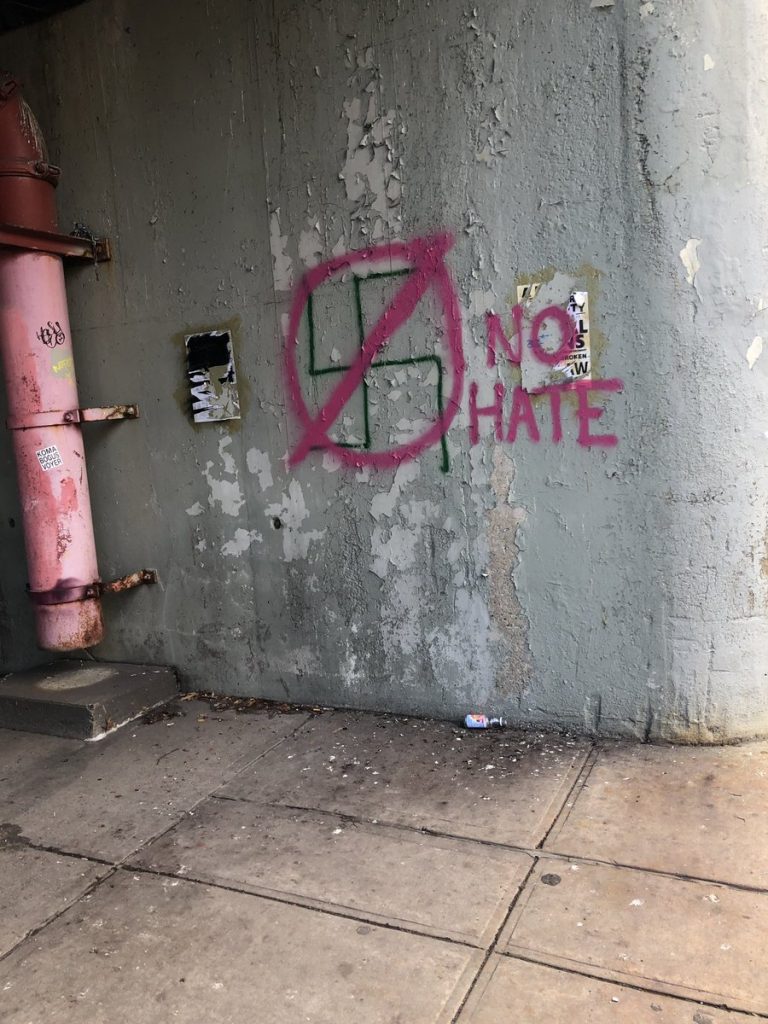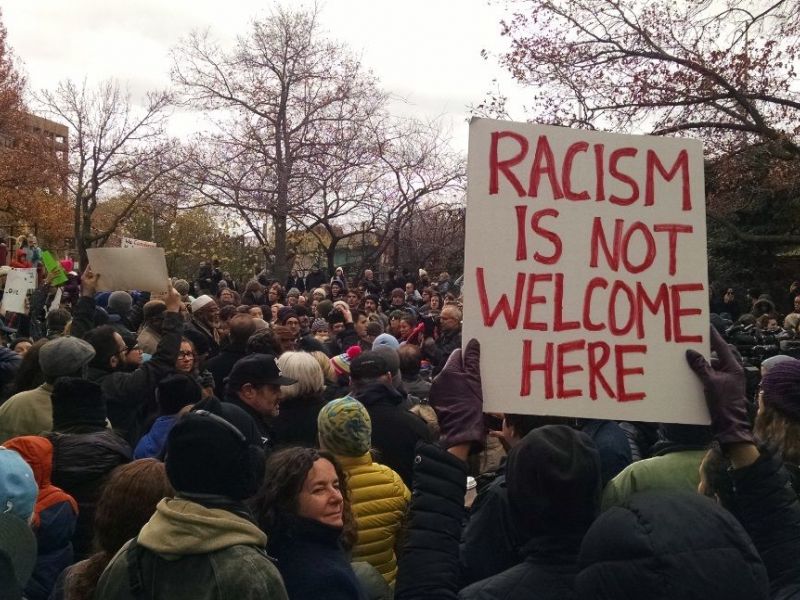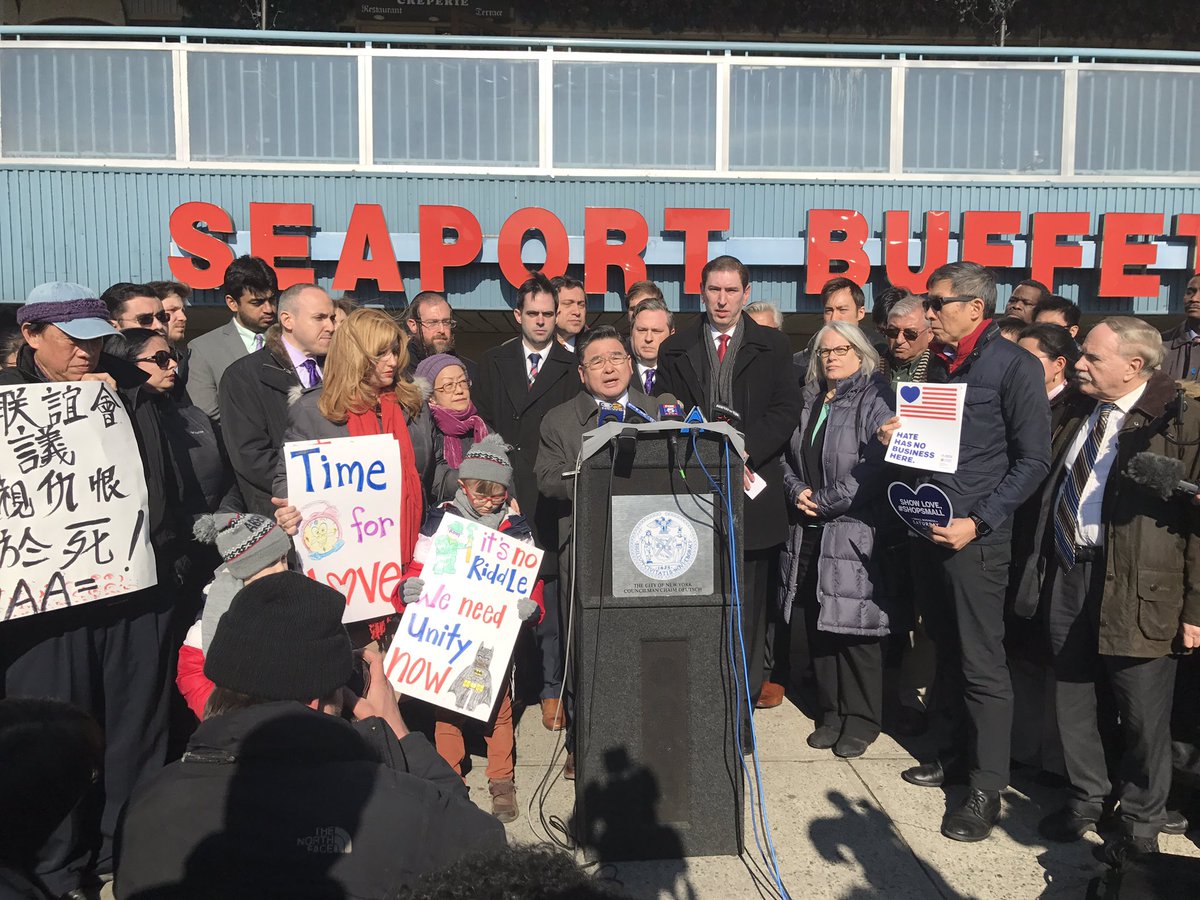New York City has seen a sharp rise in the number of hate crimes this year. In just the first six weeks of 2019, 55 hate crimes have been reported, two-thirds of which were anti-Semitic attacks. The New York Times reports that it's an increase of 72 percent from the same period in 2018. The uptick comes after a year when bias crimes were already on the rise.
 |
|
Swastika in Greenpoint, Brooklyn spray painted over with a circle and cross-out and the words 'No Hate' (Credit: Twitter)
|
Brooklyn District Attorney Eric Gonzalez announced in December that his office was opening a dedicated Hate Crimes Bureau to deal with the rising problem of anti-Semitic hate crimes and other bias-motivated attacks. The Hate Crimes Bureau is dedicated to investigating and prosecuting crimes that are motivated, in whole or in substantial part, by a belief or perception regarding the race, color, national origin, ancestry, gender, religion, religious practice, age, disability or sexual orientation of the victim, regardless of whether the belief or perception is correct.
We reached out to DA Gonzalez to ask him about how the bureau and the police deal with hate crimes and how they are working to improve trust and cooperation with affected communities in his borough. He answered our questions via email.
 |
|
Brooklyn residents gather at Adam Yauch Park to protest swastika graffiti that appeared in the park on Nov. 18, 2016. (Courtesy of Brooklyn Patch)
|
We were happy to see you announce the Brooklyn Hate Crimes Bureau in December to address a rise in hate crime incidents in the borough. You already had a Hate Crimes Unit. Why did you choose to launch a special Bureau?
 |
| Brooklyn District Attorney Eric Gonzalez |
As chief law enforcement officer, I have a responsibility to hold perpetrators of hate crimes accountable. It may be hard to believe, but there are certain communities whose members are literally scared to walk down the street – here, in the safest big city in America – because of how they look or how they dress. That is because they feel like a target and some of them are, in fact, targeted in unprovoked and often vicious attacks. This is not a reality that I or anyone can accept.
My new, dedicated Hate Crimes Bureau, staffed with diverse and senior prosecutors, will establish a point of contact for all hate crimes and be able to give the best response to these crimes and investigate them at the earliest stages. Members of the Bureau will also reach out to impacted communities, conduct educational sessions and act as point of contact whenever an incident takes place. While we are aware of the uptick in hate crimes, establishing this Bureau is actually part of my Justice 2020 initiative, which is a comprehensive plan to make my Office the best it can be. This action plan calls for a multi-lingual and diverse staff with ongoing culturally-specific training and connections to vulnerable populations. Establishing this Bureau will go a long way in achieving these goals.
What is the Bureau’s role is in the prevention of hate crimes? How is your office engaging the community in hate crime reporting/prevention and response?
Education is key to prevention and we all must work with our young people to teach them about the history of certain groups and the seriousness of certain behaviors that young folks may not appreciate. This will take a sustained effort by many actors, not just law enforcement, and I am ready to do my part in conducting outreach and raising awareness to this issue. Part of the Bureau’s duties, as I said, is to play a leading role in this effort.
One place we are currently focusing on is Crown Heights, a neighborhood with a history of fraught relations between the African-American and Jewish communities, which experienced calm in recent decades. Unfortunately, there have been about 15 bias-related incidents in that area over the last few months and we are working with community leaders to address that.
"We are hoping to bring these two communities together and facilitate a dialogue that will include school-age children. It is a lot more difficult to attack someone you know personally."
Last week, we also held an educational forum with members of the Muslim community and plan to continue this conversation with other minority groups.
Hate crimes are dramatically underreported across the US. Would you say that is also true in Brooklyn? What is your office doing to help immigrant communities and others who may be reluctant to come forward feel safe to report hate incidents?
It’s hard to make an accurate assessment, but we did notice a decline in crime reports from immigrants over the past couple of years. Besides the outreach efforts the Hate Crimes Bureau is engaged in, we have an Immigrant Affairs Unit that is tasked with protecting our immigrant population from scams and other crimes. That Unit hosts periodic Immigration Forums throughout Brooklyn to educate folks about their rights and how to protect themselves and to emphasize that my office never reports anyone to the immigration authorities and protects all Brooklyn residents, regardless of status.
In mid-2017 I also hired two immigration attorneys – the first DA in the country to include this expertise in-house – to educate my staff on this complicated issue and to implement a new policy aimed at minimizing the collateral consequences of criminal convictions of non-citizens. I did that because I don’t think it’s right for someone to be deported because of a low-level offense, but this policy also sends a clear message that we are treating everyone fairly – defendants, witnesses and victims of crimes, no matter how they arrived to Brooklyn.
Since the hate crimes bureau was announced in December 2018, there has been an increase in anti-Semitic incidents in NYC, The NY Daily News reports that "in just the first three weeks of the year, 15 anti-Semitic hate crimes have taken place in the city — seven more than this time a year earlier, officials said." And WPIX reported this week that citywide, hate crimes are up a staggering 78% in January 2019. How is the hate crimes task force working with the community to address the threat?
As I mentioned earlier, we are liaising with community groups and leaders to address this issue and focus on spots where we noticed troubling upticks. We are also vigilant in thoroughly investigating these crimes and bringing appropriate charges.
NYPD Hate Crimes Task Force leader Mark Molinari told The New York Times in October that one of the challenging aspects of the increase in incidents was that "not one person caught or identified as the aggressor in an anti-Semitic hate crime has been associated with a far right-wing group." Officer Molinari said that it's "every identity targeting every identity." Most hate crimes are not committed by assailants affiliated with organized hate groups. Are there organized hate groups operating in Brooklyn?
We are not currently aware of organized hate groups in Brooklyn that have been implicated in these types of attacks.
 |
|
A 22-year-old Yeshiva student was punched in the face in Crown Heights, Brooklyn, while walking down the street and talking on the phone. A few hours later, a 51-year-old man was beaten so badly by the same assailants that he was hospitalized. All three assailants were arrested and charged. (Image from police camera)
|
In January, two Jewish men were beaten up on the street in Crown Heights, Brooklyn, and three men were charged with hate crimes. What does that charge carry in terms of additional punishment? Are hate crime charges hard to prove?
The three defendants in this case were charged with attempted first-degree assault as a hate crime and other related charges. A hate crime charge increases the crime by one degree, which means the top charge in this case is akin to first-degree assault that can carry a maximum sentence of 25 years in prison.
 |
|
Politicians and community members gathered for a unity rally following the horrendous hate crime in Brooklyn that claimed three lives. (Photo: Twitter) |
It is true that hate crimes can be challenging to prove. It is the only time that my prosecutors don’t have to just prove that a crime was committed, and the defendant committed it, but also must prove a motive beyond a reasonable doubt. This can be done based on comments the defendant may have made before, during or after the crime or other evidence related to the victims that were targeted, which can be difficult to prove under current law. In addition, the mere use of a racial epithet, for instance, does not automatically make an attack a hate crime; the crime must be motivated by animus and not by other factors. It’s important to understand that even when a jury rejects hate crime charges, the underlying crimes – like assault – can still lead to a conviction and an appropriate punishment.
Another crime that gained national attention last month in Sheepshead Bay — in which a man wielding a hammer killed three Asian men in a gruesome attack at the Seaport Buffet restaurant — is being prosecuted as a hate crime. Can you talk about the reasons that case fit the criteria of a hate crime, and more generally, the process you use to evaluate what is and what is not a hate crime?
This case is pending in court and it wouldn’t be appropriate for me to discuss the evidence. Generally speaking, we evaluate whether there is evidence that shows, as the law instructs, that the offense is committed or intended to be committed in whole or in substantial part because of a belief or perception regarding the race, color, national origin, ancestry, gender, religion, religious practice, age, disability or sexual orientation of a person, regardless of whether the belief or perception is correct. To do that, we speak with witnesses and review other evidence to determine if the defendant made any comments regarding the motive (at the time of the incident, in a statement to law enforcement, etc.) or whether people who are not part of the protected groups were left alone, among other investigatory steps.
(This interview was conducted via email and has been edited for clarity.)
Add new comment